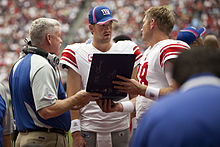Offensive coordinator

The offensive coordinator is part of the coaching staff of an American football team and is responsible for the offense .
Definition of terms
The offensive coordinator is in the chain of command together with the defensive coordinator and the special teams coordinator directly below the head coach . He is responsible for all offense players and assistant coaches. He is subject to the guidance of the various assistant coaches of the offensive (offensive line coach; receiver coach; quarterback coach; etc.). In the lower amateur areas, due to budget constraints, the offensive coordinator also takes on the tasks of his actual assistant coach.
The main work of the offensive coordinator, however, lies in the creation and optimization of offense moves and the creation and development of a general style of play or tactics. During a game it is then his job to select the appropriate moves and pass them on to his quarterback. However, it also happens that head coaches who think very aggressively take over the selection of the moves themselves. The offensive coordinator then becomes a kind of direct assistant to the head coach.
Like the head coach, the offensive coordinator is free to choose where he or she is during a game. In the professional field, he is usually with the team in the team zone on the edge of the field. However, there are also offensive coordinators who prefer to watch the game from a stand ( coaches box ) in order to have a better view of the opponent's defense line-ups . In both cases, the offensive coordinator is connected to his quarterback by radio. Since most amateur clubs do not have this option, the offensive coordinator is always on the sidelines and passes the moves on by shouting.
The position of the offensive coordinator in professional football is often the preliminary stage before the post of head coach. Many professional head coaches were either offensive or defensive coordinators in their careers.
literature
- Bowy, Knitter, Rosenstein: American Football - From Kick-off to Touchdown, Weinmann, Berlin 2002, ISBN 3-87892-054-7